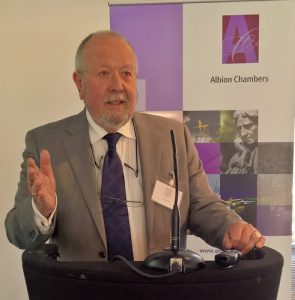December 2016 ~ switch in ABI responsibility for Dick Smith
In changes to the Governing Council of the Association of British Investigators (ABI), Dick Smith is switching from Membership and Selection Chairman to responsibility for Law Enforcement Liaison. “I am currently updating the police in respect of fraudulent companies offering misrepresented investigator training courses coupled with guaranteed work opportunities,” he said. “Over the past two years, this has become an increasing problem for those wishing to enter the profession . . . an issue which would not pertain were the promised industry regulation to have been delivered by the Government.”
November 2016 ~ Scams costing £260m-plus to UK SMEs
Research by Bristol law firm, Slater and Gordon, indicates that nearly one in five small businesses who have been defrauded fail to report it. Expanding further, they conclude that escalating scams and poor prevention have led to hidden annual losses of more than £260m to UK businesses. This data was based on a survey of 500 SMEs. Fraud committed by employees was found in a third of cases and by a contractor one in four times.
October 2016 ~ “If the price is right” ~ a voice from the past!
Norfolk PI, Barrie Peachman, claimed in a press interview that lawyers were employing private detectives with dubious backgrounds “provided the price was right!” The Law Society naturally denied the claim. The encounter might have been written yesterday, but the quotes were spotted this week surfacing in an “Eastern Daily Press” article dated 23-Nov-82. Barrie was incoming Principal of the Institute of Professional Investigators (IPI) and on the Governing Council of the Association of British Investigators (ABI). Dick Smith of IPFGB has been a member of both organisation for many years and is currently on the GC of the ABI. He said, “Thirty-four years later, we still learn of lawyers who come unstuck by using ‘cowboys’ masquerading as professional investigators. Government regulation still looks a long way off. Nowadays, the ABI insists on strict background checks, appropriate qualification and a code of conduct. As such, the association is endorsed by The Law Society. But other than The Law Society’s recommendation for their members to use ABI investigators, there is still nothing preventing law-firms scratching around for the cheapest option. That runs the risk of setting into motion unlawful activity which can bounce back on the law-firm and its client!” he said.
October 2016 ~ Movement from THO . . . at last . . . maybe?
A Home Office review of the security industry as a whole is now to be submitted to Ministers for their consideration and agreement or otherwise on recommendations. On the SIA website, the following is included:
“ . . the scope and appropriateness for us taking on additional functions including those that may already be provided by other organisations, or functions that could further enhance our role in the future. These will include business licensing and the licensing of private investigations.”
If the Ministers agree, then they will need a legislative slot. THO will publish a report after or before the Ministerial response, but they hope to do so before the SIA’s annual conference; the date of which appears to be unpublished.
October 2016 ~ “UK has taken a step backwards on licensing”

Addressing the ABI autumn seminar at the Union Jack Club in London was Paul Scanlon, the Chief Executive of the Private Security Authority in Ireland. Having been given every indication by the Home Office that the UK was introducing Investigator Regulation by 2015, the Irish Government swung into action to introduce its own licensing legislation. “We imitated much which had been prepared by the Security Industry Authority in Britain,” he admitted. From instigation to implementation it took the PSA in Dublin just ten months to issue the first licence. Now less than a year after introduction, he was proud to say that it had already made great strides in realising its goal to remove the cowboy element from the industry; the public and commerce in Ireland today being protected and provided for by professional operators. Asked if he was still liaising with the British Government, he said, “We have continued our contact with the SIA and far from licensing in the UK being on the agenda, it is now plain to see they have taken a step backwards.”
October 2016 ~ “Failure to Prevent” offences by employers
The Attorney General is proposing to expand ‘white-collar crime’ laws to include money laundering and false accounting by employees. This could result in senior executives being prosecuted for offences, including fraud and money-laundering, carried out by their staff. Jeremy Wright has revealed that consultations are taking place on the expansion of “failure to prevent” offences, which currently cover only bribery and tax evasion committed by employees. In questioning who is responsible for economic crime, he said, “The answer is to be found at every level, from the boardroom down. Both corporations and individuals are responsible.”
October 2016 ~ Brexit and General Data Protection Regulation
The ICO believes that Britain’s decision to leave the EU will have little impact for companies in relation to GDPR, which is scheduled to be implemented across Europe in 2018. Many organisations in the UK, most obviously those operating internationally, will still need to comply with the new EU regulations. The GDPR has several new features . . . . for example breach notification and data portability. The ICO has announced it will be speaking to government to explain its view that reform of UK data protection law remains necessary.
September 2016 ~ SIA Deputy Director gets suspended sentence
Embarrassing revelations have dogged the SIA since its inception. (We can all recall they issued thousands of licences to illegal immigrants, claiming it wasn’t their job to carry out checks.) Fabulously-paid directors and deputy directors have come and gone with amazing regularity. Being a self-financing organisation, it pays for its way through the imposing of licence fees and fines, the latter most often levied against other Government departments, i.e. public money. Yet the generous salary proved insufficient for Charlotte Jennings, a Deputy Director, who fraudulently claimed £37,000 in travelling allowances in a brief 18-month ICO posting to London. When challenged, she created fake bank statements in an effort to cover up her crime. City of London Fraud Squad were brought in and Jennings was weighed off with a suspended prison sentence at London Crown Court. In referring to the case as “disappointing,” the SIA CEO described Jennings as “not a model citizen.”
September 2016 ~ High Court overrules ICO on Data Protection
“Once more, the Information Commissioner’s Office has been shown to be over-cautious in the way it interprets data protection law,” said Dick Smith of IPFGB. In a High Court ruling in the case of Bangura v Loughborough University [2016] EWHC, it was held that a University which, without his consent, released personal data to the Police in respect of a rape suspect, was acting lawfully, even though the s29 request was made verbally. “This common-sense decision flies in the face of advice from both the ICO and what was ACPO,” he continued. “In rejecting the claimant’s arguments, the court held that the disclosure was in connection with the prevention and detection of crime and there was nothing in the Act specifying the request had to be in writing. With the abrogation of responsibility by the authorities to investigate crime becoming much more common, data processors may well expect an increase in requests from investigators in the private sector.”
August 2016 ~ Will CoHo destroy valuable records?
Companies House is considering destroying all records after a six-year period, so it is reported. “If sanctioned, this will greatly reduce the ability to carry out comprehensive due diligence in respect of companies and individuals with whom British industry is expected to do business,” said Dick Smith of IPFGB. “Under the guise of ‘Data Protection’, a CoHo spokesman has admitted that this crackpot move, something that the man on the Clapham omnibus would consider an erosion of transparency, is being seriously considered.
“If successful, this would present further opportunities for unscrupulous or failed business people, (apparently from whom the pressure on Government is being applied), to hide their past and present themselves as clean, honest individuals. There is no doubt in my mind that HMG will not listen to commercial investigators or their clients, but journalists of all political persuasion are picking up the cudgel; so let’s hope they can knock this crazy idea firmly on the head!”
July 2016 ~ Fraud costing UK economy £193bn per annum
The University of Portsmouth’s Centre for Counter Fraud Studies has issued a report which has produced this estimate. Accepted to be Europe’s premier fraud research centre, it has revised and renewed research undertaken by the Government up to 2013. It reveals the staggering true cost of fraud – an average of more than £3,900 per adult in the UK, with losses taking place at the rate of £6,000 per second.
July 2016 ~ Regulation of the Private Investigation industry . . . . .
“To ask Her Majesty’s Government what progress they have made on the introduction of a system of regulation for private investigators as announced by the Home Secretary on 31-Jul-13.” Baroness Henig (Hansard 26-Mar-15)
Response from Lord Bates . . . “We are not refusing to act. In case it has escaped the noble Baroness, lots of other pieces of legislation have been going through during this Parliament. We have not managed to get this regulation in. It is a priority, it is something that we are committed to and it will happen early in the next Parliament.”
That Parliament commenced in May 2015. The Home Secretary who made the announcement in 2013 was Theresa May. Will her position as Prime Minister accelerate the process? As has been the case since 2001, we can but wait and see!
July 2016 ~ Identity fraudsters targeting the young
New figures indicate a 52% increase in young people falling victim to crime. In fact, in six years, under-30s victims have more than doubled to 24,000. On the Action Fraud website is a 100-second video which demonstrates how easy it can be with just a little bit of knowledge to build up a profile sufficient to steal an ID. Recently filmed in a London coffee shop, it uses covert cameras to capture baffled reactions from people caught in a stunt where their personal data, all found on public websites, is revealed to them live on a coffee cup. It’s worth a look . . . . . actionfraud.police.uk/news/identity-fraudsters-targeting-young-people-jul16
June 2016 ~ “Taking client records is a criminal offence” . . . ICO
So says Steve Eckersley, Head of Enforcement at the Information Commissioner’s Office.
“Employees need to be aware that documents containing personal data they have produced or worked on belong to their employer and are not theirs to take with them when they leave. Taking client records that contain personal information to a new job, without permission, is a criminal offence.”
The statement followed the conviction of a Shropshire-based individual who took 957 emails from his employer as he was leaving to start a new job with a rival company. He was fined £300 with £405 costs for the s55 Data Protection Act 1998 offence.
“This sort of behaviour is far from rare. IPFGB has been called in many times to prove that individuals have, for example, lifted client databases to assist them starting up in competition,” said Greg Smith. “Due to the reluctance or refusal of the Police to act in such matters, civil litigation has been the customary remedy. But it is encouraging to see existing law being enforced on this occasion. IPFGB can provide an essential service, working in conjunction with victims’ lawyers, to deliver the critical evidence.”
May 2016 ~ Dick Smith addresses Albion Chambers seminar
 Around 75 employment lawyers from around the southwest were at the prestigious harbour-side @Bristol Conference Centre to listen to a day-long series of presentations entitled “Practical Considerations in Workplace Investigations and Disciplinary Procedures.”
Around 75 employment lawyers from around the southwest were at the prestigious harbour-side @Bristol Conference Centre to listen to a day-long series of presentations entitled “Practical Considerations in Workplace Investigations and Disciplinary Procedures.”
Albion Chambers provided expert barristers:
Monisha Khandker: covert recording and its use in Employment Tribunals;
Simon Emslie – Emails and electronic data, a gold mine of information;
Alec Small – HR and formal hearings; how involved is too involved?;
Richard Shepherd – Legal and litigation privilege; testing the boundaries of admissibility.
Dick was the guest speaker; his talk described as “helping delegates understand what can be achieved in workplace investigations, where the pitfalls are and the legal framework in which he operates. This will be a practical, no-nonsense introduction into using private investigators.”
He strongly advocated using only investigators who have proved their integrity and are members of recognised associations within the profession; particularly the Association of British Investigators, the only organisation to be endorsed by the Law Society.
Dick unravelled some of the myths of what can and cannot be legally achieved in the UK, defined the many services available from the professional investigation industry and, in providing an insight into some of the tricks of the trade, described two practical cases in which absenteeism and breach of contract were the major issues.
April 2016 ~ “More use of outside investigators by law enforcement” ~ Sir Jon Murphy

Addressing the Association of British Investigators, who were holding their AGM in Liverpool, the Merseyside Chief Constable said, “There are 10,000 fewer Police Officers in England & Wales now than there were six years ago and one in four of those remaining are in London. Now more than ever, law enforcement will need to rely on the experience and cooperation of ladies and gentlemen such as yourselves in the fight against crime.” Sir Jon Murphy, who was guest of honour, will soon be retiring after 41 years’ service.
April 2016 ~ can UK law enforcement cope with SOC?
Serious and Organised Crime (SOC) threatens national security and is estimated to cost the UK at least £24 billion each year; (Govt figures). It includes: trafficking and dealing in drugs, people, weapons and counterfeit goods; sophisticated theft and robbery; fraud; money laundering and other forms of financial crime; and cybercrime.
“Sadly, the answer to the question is ‘No’”, said Dick Smith of IPFGB. “These days, fewer and fewer of our clients ever bother to report fraud or theft, whether they are the victims of SOC or from a one-off incident perhaps committed by an employee. Even if the case were to be accepted as a crime by the Police or ‘Action Fraud’, and the perpetrators and the evidence presented on a plate, it no longer makes commercial sense to go through the tortuous process of reporting and then to wait months and months for CPS to take the matter through the courts. It is far more expedient to instigate immediate civil action against the fraudsters/thieves, using expert law-firms working hand-in-glove with qualified independent investigators.”
March 2016 ~ “Frustrating wait” for Home Office review
“The Home Office team is working through the replies to the public consultation,” writes Peter Selwyn-Smith, the Stakeholder Manager with the Security Industry Authority, “It will determine when the publication of the report takes place. We anticipate publication in late summer, depending upon the parliamentary timetable, but there is a need to manage expectations realistically. The question of PI licensing was addressed in the consultation, and it will be a part of the final report. We will all have to wait for their recommendations. I do understand the frustration that the wait causes.”
February 2016 ~ ABI maintains Law Society accreditation
IPFGB staff are members of the Association of British Investigators. The Law Society continues remind their members that the ABI “offers solicitors peace of mind when choosing investigative service suppliers.” See: http://www.lawsociety.org.uk/support-services/membership-extra/business-services/abi
January 2016 ~ ECHR rules monitoring of Messenger account did not break convention
On 12-Jan-16, the ECHR returned an interesting finding in respect of employers’ rights (or otherwise) to electronic surveillance of employees at work; ruling that a company acted within its disciplinary powers.
A Romanian sales manager had been dismissed from his job for sending personal messages during working hours. In supporting these accusations, the employer accessed the employee’s messaging logs. The employee lost his case in a Romanian court and took the matter to ECHR, claiming it to have been an unjustified breach of his right to privacy. In reaching its findings, the ECHR pointed out that his employer’s internal regulations expressly prohibited any non-professional use of workplace equipment and the employee’s Yahoo Messenger account could have been accessed on the assumption that the communication related to professional activities. It was held that it was not unreasonable for an employer to want to verify that the employees complete their professional tasks during working hours. The monitoring had been found to be ‘limited and proportionate’ since other data and documents on the PC were not examined.
In light of these facts, the Court considered that the Romanian judiciary did not exceed its margin of appreciation in finding that the employer acted within its disciplinary powers.
IPFGB is regularly retained to uncover evidence of employee misconduct. Dick Smith said, “Initially, this ruling appears to give some latitude to employers. However, they most certainly should not consider they have ‘carte blanche’. In previous telephony and email monitoring cases (particularly those of Halford and Copland), ECHR has previously ruled breaches of the HR Convention have occurred.”
January 2016 ~ “ABI offers peace of mind when choosing investigative service suppliers”
The Law Society continues to grant the Association of British Investigators its endorsement and recommends solicitors to consider this when instructing investigators.
Read more: lawsociety.org.uk/business-services/abi
The Association of British Investigators is now recognised as the premier professional body for private investigators working in the UK and beyond. A non-profit organisation, its national and international membership provides credibility and due diligence. IPFGB partners cherish their ABI membership. Dick Smith is the Membership Chairman on the Governing Council.
January 2016 ~ Balancing the cost of ‘internal company fraud’
Commenting on a recent ‘internal fraud’ case which IPFGB was instrumental in referring to law enforcement and successfully pressing for prosecution, Dick Smith said, “On this occasion, when confronted the fraudster did the ‘honourable’ thing by resigning on the spot. Nevertheless, many, many months later, the case is still awaiting trial due to the painfully slow progress of the police and CPS.
“In London, for example, it takes up to 18 months to get a fraud case to court. If the worker remains employed but suspended during all that time, then the cost of continuing his/her salary whilst engaging a replacement has to be balanced against ‘biting the bullet’ and dismissing immediately for gross misconduct, thereby possibly risking the cost of a future tribunal battle. The question is, ‘Which is the cheaper option?’
“Of course, prevention always being better than cure, comprehensive pre-employment checks in respect of prospective employees should be an essential part of company policy. But it does not stop there. That due diligence should be revisited periodically during the life of an employee’s term with the company, particularly when added responsibilities and opportunities for theft or fraud are presented through promotion or reassignment,” he said.
January 2016 ~ ABI continued accreditation by Law Society
“The Association of British Investigators offers solicitors peace of mind when choosing investigative service suppliers,” quotes the Law Society website . .
lawsociety.org.uk/support-services/membership-extra/business-services/abi/
“The Association of British Investigators is now recognised as the premier professional body for private investigators working in the UK and beyond. A non-profit organisation, its national and international membership provides credibility and due diligence.”
(Dick Smith is an ABI Governing Council member.)

